slit scan ++ or any other pixel sorting way?
-
here's a fun video with slit scan https://www.instagram.com/p/CC...
-
@bennnid said:
here's a fun video with slit scan https://www.instagram.com/p/CC...
Love this! Simple but effective.
-
@bennnid said:
here's a fun video with slit scan https://www.instagram.com/p/CC...
That's awesome, do you mind if TroikaTronix shares it on our social media as well?
-
@Woland thanks a lot, I think I'm going to do a better one to share, this was only a 1st test;-)
BTW do you know a way to get the FaceTime HD cam on MBP16' to manual brightness and focus? I tried webcam settings from Liang-Hsin Chen (mactaris@mac.com). But couldn't find a way to make it work with Catalina ( I guess authorization problem as for many soft since security "enhancement"...
@mark, I found a way to change speed of slit scan by combining slit scan with matte++ to transform resolution allowing gaining speed, if there is another way let me know ;-) (see patch)
In this version matte++ helps a lot to speed up slit scan drawing but I got some stairs when the frame moves to fast, so not solving a 100%...,could we be able to change slit scan speed, refresh, and quality?
other problems;
1) side scroller and flip GLSL makes a bad looking line junction when mirroring breaking the effect any better actor for that?
2) I'm wondering how to mix my layers in the better way to get a continuity... crop? effect mixer? I also tried alpha mask with blurred square from shapes to get a softer edge but I feel it's making a "dark" junction...
What compositing technique would you use? Is there a blur edge actor you like?
3) How is it possible to use a video delay more than 1000 frames? ( I know it's really ram consuming but I have a lot... ), I tried though capture to disk but can't read on a writing file,. buffer could be a solution for more than 1000 frames?Thanks for your remarks and help!slitiza.izz
-
@bennnid said:
do you know if it would be possible to add a speed parameter to slit scan actor?
I forgot to say that I recorded this as a feature request.
@Bennnid said:
1) side scroller and flip GLSL makes a bad looking line junction when mirroring breaking the effect any better actor for that?
I'm not entirely sure I understand your description, but I'd suggest just experimenting with combining actors to see if you can get the desired effect. Also "Side Scroller and Flip" is not one of our GLSL or FFGL plugins from the TroikaTronix pack so I don't have it and can't see what it's supposed to do when I open your patch. Is this a third-party plugin?
@Bennnid said:
2) I'm wondering how to mix my layers in the better way to get a continuity... crop? effect mixer? I also tried alpha mask with blurred square from shapes to get a softer edge but I feel it's making a "dark" junction...
What compositing technique would you use? Is there a blur edge actor you like?Again I can't see what your patch is supposed to do because of the missing plugin so I don't quite understand what the issue is. You can mix multiple layers by setting two or more Projector actors' 'blend' mode inputs to "transparent", setting the layer to different numbers (higher numbers will be in front), and then feeding your different content to those different Projector actors.
Try Effect Mixer, Multimix, Contrast Adjust, HSL Adjust, Edge Blend Mask, TT Edgeblend (GLSL), TT Highlights and Shadows (GLSL), other TT GLSL Shaders, the TT FFGL effects, and all the video effects.
If you've got a dark spot you could try making a crop of just that area and sending it to the right place on the Stage with additive blending and adjust the contrast of that sliver until it's no longer dark.
@Bennnid said:
3) How is it possible to use a video delay more than 1000 frames? ( I know it's really ram consuming but I have a lot... )
Proceed at your own risk (your computer may REALLY not like this) but you could chain together multiple Video Delay actors set to 1000 frames. (Note you will need to wait for 2000 frames until you'll actually see any video output because they won't have anything to display until the 1st frame from your video source is pushed all the way through by new frames and becomes the 2001st frame. Thus, if you're doing this live, know that you'd need to start video capture through these actors 66.7 seconds [assuming 30fps capture rate] BEFORE you want to project the result because from the time you start capture, the first frame to get through the 2000 frames of video delay will come at 66.7 seconds.)

-
@woland
thanks for adding my request;-) (sorry next time I 'll go straight there ! )
for side scroller and flip here's the link (maybe another isa GLSL or plug makes it better? ) https://editor.isf.video/shaders/5e7a7fa27c113618206de187
and the converted GLSL https://we.tl/t-3Xzca6TNmQ
thanks for all the blending tool I'll go trying those I haven't yet,
I tried chaining delays but relation between added time and measures delay Is a bit wired till now...thanks so much for your inputs! Bests
-
@Woland TT edgeblend doesn't propose an output... nore a stage to send signal ... any idea? (help is empty)
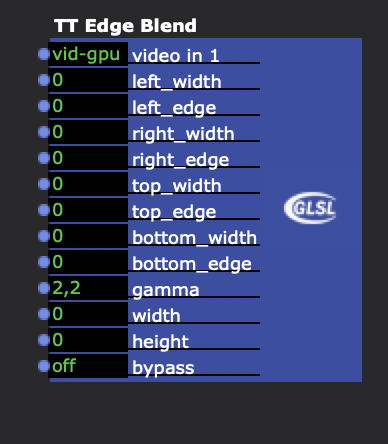
can you also tell me if there is a difference between using stages to join frames side to side with projectors, or using crop and pan user actors?
-
@Bennnid said:
TT edgeblend doesn't propose an output
Well that's definitely a bug. I just logged it.
@bennnid said:
can you also tell me if there is a difference between using stages to join frames side to side with projectors, or using crop and pan user actors?
I actually don't know the answer to this, but you could easily do a quick test to see if they look different
-
Hi @Woland 1st thanks so much for your help
Actually using stages finds another way to solve problems ( changing slit scan speed becomes easy by selecting a part of slit scan output and stretching it...
Although I face several problems: (I'm working 1080X1920 so to say on portrait)
- in stage setup when I change default display size, newly created stage are on defaulted size but not the virtual stage...
>virtual stages are not impacted by default display size? maybe normal...
<< Actually same pb with izzymap and a new projector set on an existing stage in portrait, easy map opens an output but in landscape...
- sometimes clicking on "custom" makes izzymap refreshes on the numbers on the box and it changes... sometimes the numbers are still the other way around... -
@Woland oh and last thing, do you know why izzymap gives strange point adjust number? although I'm on 1080X1920, horizontal point adjust goes 0 to 1080, (nothing to say it's clear) whereas vertical point which I expect to go from 0 to 1920 shows values from -2074 to 3994... which is super hard to read, difficult to adjust to real screen size, and asks a lot of calculation to split and divide screen... what is fun is that the sum of minus and max matches the resolution output, ... drives me a bit mad I have to say....
thanks again !
-
I submitted a bug report for this last thing https://community.troikatronix...
-
@bennnid said:
in stage setup when I change default display size, newly created stage are on defaulted size but not the virtual stage
This is the correct behavior. You changed the Default Display Size and Virtual Stages have no physical displays assigned to them (hence why they're Virtual Stages).
@Bennnid said:
<< Actually same pb with izzymap and a new projector set on an existing stage in portrait, easy map opens an output but in landscape...
Tips for working with displays in portrait mode:
1. Make sure that in system preferences, your portrait mode display is not before your primary display
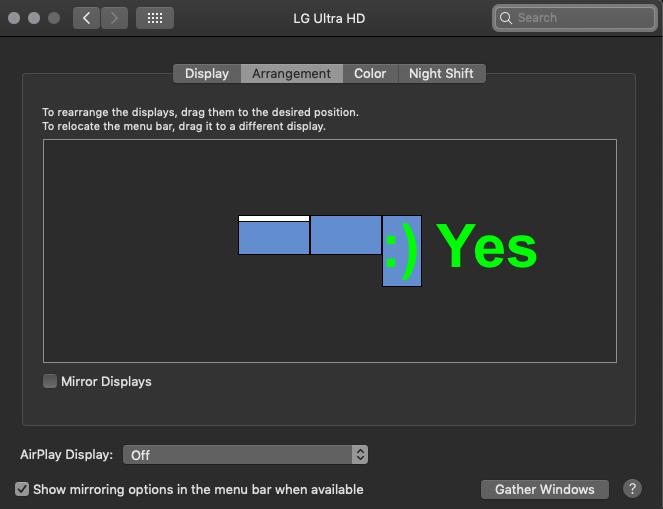
Not like this
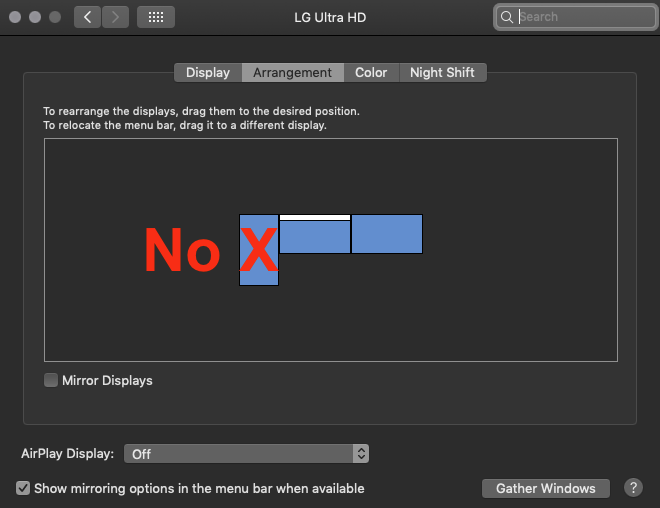
2. Got to Stage Setup and make Stage 1 target the proper display. It should match the resolution of the portrait mode display automatically. (Note: I didn't have to set a custom stage or display size because both were pulled automatically based on how the display was set up in System Preferences.)
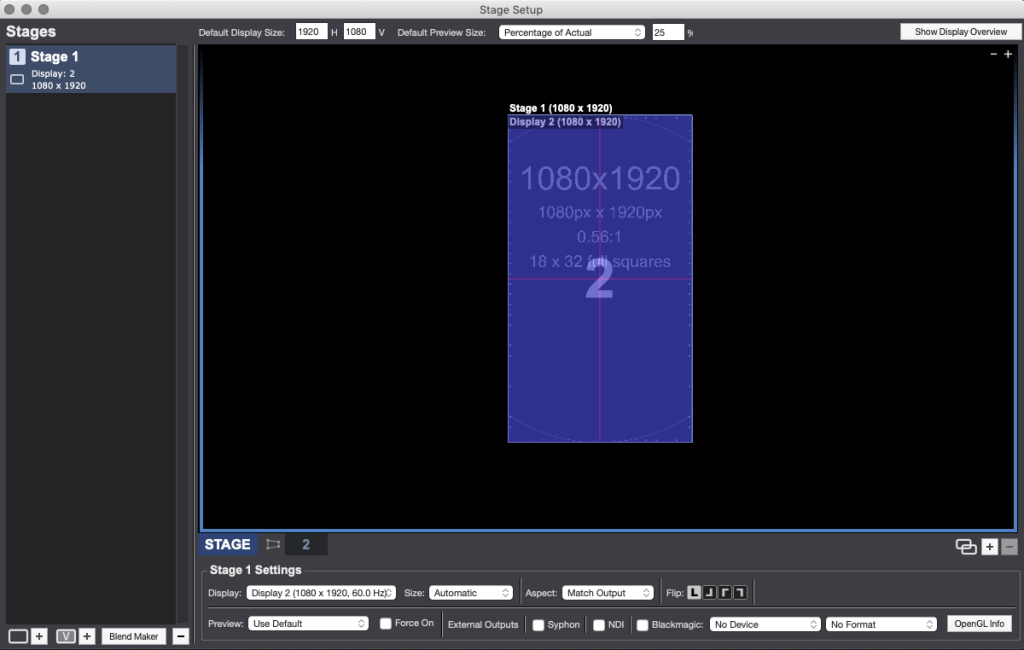
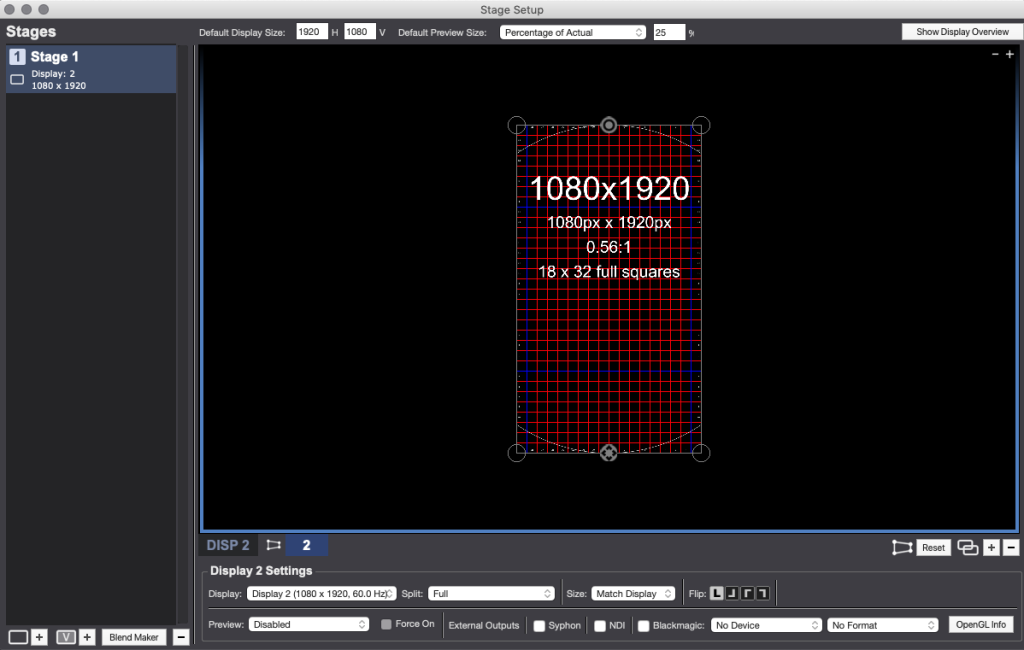
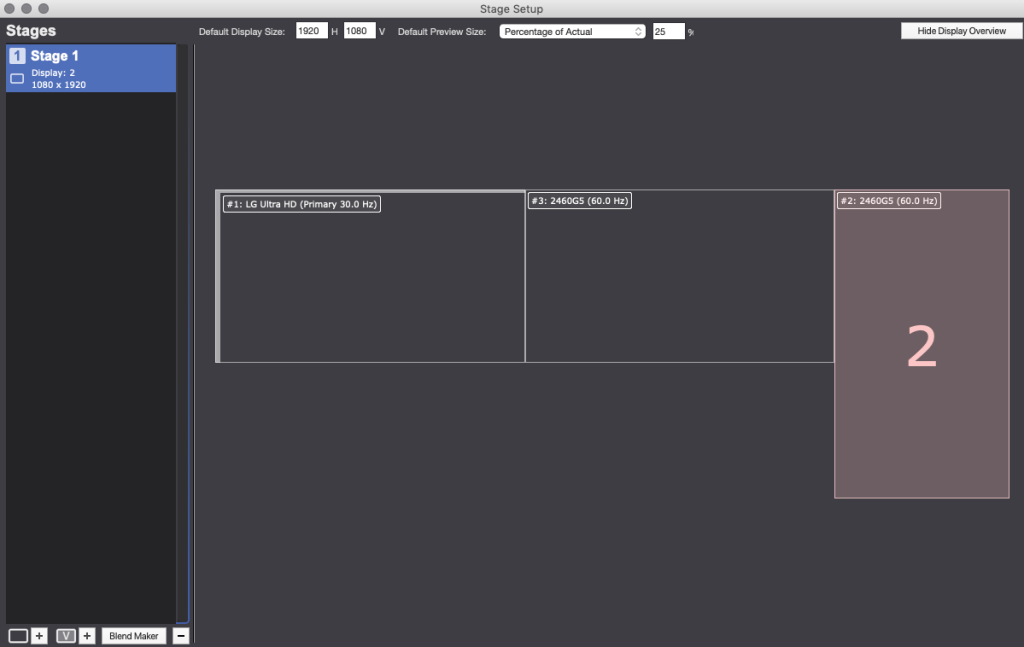
3. After doing this, in this order, if I then create a 1080x1920 test image, import it, and then drag it into the Scene to create a new Picture Player and Projector actor, I can see that the 1080x1920 image fills the 1080x1920 Stage just fine without adjustments. If I double-click the brand-new projector, it automatically sets the output size in IzzyMap to "Custom: 1920x1080" (You're right, this should say "1080x1920"), and for me it defaults to portrait if the display and Stage were already set up before I created the Projector actor and before I double-clicked on the Projector actor to open IzzyMap.
This displays on my portrait display just fine but you're right, there's something wonky about the numbers it's displaying when I click on the points in IzzyMap. I'll log this bug.
Here's the file I put together to test this, in case that's helpful to you. It also includes a 1080x1920 test image made with this handy website.
Best wishes,
Woland
-
@Woland my bad ! thanks !
-
Hi as you propose you can share the video on insta , it would have been better without autoexposure of FaceTime cam of my MBP but I couldn’t find a way to take the hand on it!
Best regards